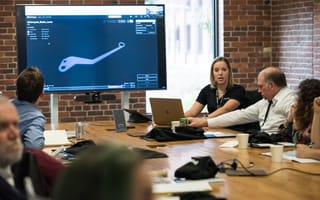For most engineers, a typical work day might look like the following: coffee, code, coffee, code, lunch. After a few years, one might hope to move up the career ladder. And for some engineers, a position in management could be the next rung.
But engineering managers aren’t just senior-level coders or developers. There are a multitude of other skills necessary for being a successful people manager, including soft skills like clear communication and conflict resolution. So how do engineers learn to cultivate traits like empathy and mentorship in a tech-heavy job?
For HPR’s Director of Engineering Christopher J. Pendleton, it all comes down to experience and balance.
“A good engineering manager must know the technology well and be an expert in the jobs that the teammates are performing,” Pendleton said. “This job is a balancing act between when to get involved and when to step back.”
Engineering managers across Boston are challenged to find new ways to motivate their team and provide resources to optimize their engineers’ skills. According to The Predictive Index Lead Software Engineer Shaun Avery, it’s crucial for managers to champion their team members internally and externally, celebrating their victories and making sure no win goes unnoticed. For more on the pathway to becoming an engineering manager, read what our six experts wrote, below.
HPR exemplifies the motto, “for engineers, by engineers.” The company builds software, hardware and networking technology that is used in stock markets worldwide. But high-stakes clients can lead to high-pressure tasks. Director of Engineering Christopher J. Pendleton focuses on training his team in best practices so engineers are confident in delivering a high-quality product.
How did you become an engineering manager?
I studied computer science and physics in college and started my career as a software engineer in a medical device startup. I got hooked on developing software that impacted people’s lives. By continually improving my coding skills, I started to master the process and began to take on leadership opportunities. I became a tech lead and organized peer design reviews and training sessions. Engineers looked to me for guidance in their code and career paths. I became more valuable to the organization in this new role than I was as an individual contributor.
I work to remove obstacles blocking the engineers from achieving their tasks.”
What are your job responsibilities?
I lead a team of 12 engineers in complex technical projects involving high-performance hardware and software. This requires careful management of project logistics to consistently deliver working systems on time. I train my team in engineering best practices to ensure a high-quality product. A typical day includes negotiating requirements with demanding clients and pushing us toward project milestones. I like to minimize team meetings, but I do run daily agile-like stand-ups to promote team communication. I work to remove obstacles blocking the engineers from achieving their tasks and look for opportunities to advance them toward their career goals.
What makes a good engineering manager?
A good engineering manager must know the technology well and be an expert in the jobs that team members are performing. You then are credible, can transition into a strong mentor and create a cohesive, successful team that works well together.
This job is a balancing act between when to get involved and when to step back, finding projects that feed into an employee’s strengths and help them grow. At HPR, decisiveness and an execution mindset are especially important. My success is measured on the impact I have in meeting our project’s objectives with engineers that are happy, motivated and growing.
Working at The Predictive Index gives Lead Software Engineer Shaun Avery many resources for managing his team. By using scientific assessments, management training and consultation from behavioral experts, The Predictive Index helps businesses overcome workplace challenges. Avery implements those resources internally and uses them to mentor his team.
How did you become an engineering manager?
I’ve been programming professionally since graduating college. Even back then I was taking on leadership roles during group projects. For most of my career, I’ve been really focused on learning and being the best programmer I could be. A lot of time was spent learning from my mentors and doing lots of reading to be able to implement best practices and adhere to proper usage of design patterns. I always tried to ensure I wrote clean unit-testable code.
I found myself not only enjoying programming, but loving helping others in their own technical career paths. I eventually became a mentor, a role I coveted so much. I realized I wanted to make a career out of knowledge-sharing, helping others discover and cultivate their own talents.
Being able to communicate technical direction to both technical and non-technical stakeholders is a must.”
What are your job responsibilities?
I’m currently responsible for managing, mentoring and coaching a group of four very bright and engaged engineers. My top priority is ensuring they have what they need to succeed in delivering high-quality working software by the end of each two-week sprint. This includes providing constructive feedback in their pull requests and helping solve software implementation problems.
I also lead technical solution designs with the entire team and am a sounding board for anything tech-related. I work closely with our team’s product manager and designer to refine stories, come up with roadmaps and attend meetings with stakeholders. Every once in a while, I get the opportunity to scratch that programming itch by committing code. It’s usually small tasks that aren’t deadline-driven, but are tasks I can take off my team’s plate so they can focus on providing value to our clients.
What makes a good engineering manager?
Building trust. You need to build psychological safety and trust on both sides of the relationship through conversation and open feedback. Once both parties have trust in each other, everything else will fall into place.
Being able to communicate technical direction to both technical and non-technical stakeholders is a must. You need to have the technical chops to be able to design solutions and provide technical guidance to your team, as well as be able to articulate reasons and timelines to product managers and other stakeholders that aren’t in the details each day.
Lastly, it’s important to have fun! Bringing a sense of humor and camaraderie to the team allows for good relationships and communication to flourish. Make sure to champion your team internally and externally by celebrating their victories.
Bullhorn provides recruiting software to more than 10,000 staffing companies. To manage her direct reports, Software Development Manager Tanvi Gadre is passionate about their success and career development. Creating clear processes doesn’t hurt either.
Tell us briefly about your professional background. How did you become an engineering manager?
I joined Bullhorn as an entry-level software developer in 2013. Over time, I gained a lot of core product knowledge and learned how to tackle different challenges that we face every day. The people I work with truly inspired me to strive harder and solve problems by utilizing interdepartmental communication.
What makes a good engineering manager?
Passion for seeing your team members be successful in their roles, as well as a knack for developing stable and scalable processes for more efficient execution of R&D goals.
I occasionally have small pockets throughout the day where I get to return to my roots and assist with the actual coding.”
What are your job responsibilities?
My typical day consists of several meetings, which can involve helping to unblock my teams on their daily tasks, holding one-on-ones with my reports where we discuss current work or career paths, and working closely with the product team to discuss roadmaps.
We start with short-term sprint goals before turning to long-term planning. I also work with code rollouts and assist in ensuring that releases go out in a timely and accurate fashion. I occasionally have small pockets throughout the day where I get to return to my roots and assist with the actual coding.
Mechanical Engineering Manager Bennett Wilson started as a CAD specialist before taking on leadership opportunities. Instead of solely focusing on 3D printing at Markforged, he now divides his time into project and people management as well. While no day is the same depending on development cycles, he makes time to ensure he’s providing a safe environment for team members to make mistakes and learn.
Tell us briefly about your professional background. How did you become an engineering manager?
For as long as I can recall, I’ve wanted to be a mechanical engineer. I’ve always been a huge CAD (computer-aided design) nerd. Throughout college, I was the go-to CAD guy, and I ended up handling a lot of the systems integration efforts in my group projects. After school, I spent a few years in the robotics space continuing my role as the “CAD guy,” and eventually led the mechanical design efforts of specific subsystems and products. I arrived at Markforged with that same systems-integration mindset and have had the pleasure of watching the team grow from 30 to more than 300 over the past four years. During that time, I’ve had the opportunity to take on additional project management and technical leadership roles.
A good engineering manager creates clarity and gives their team the room to grow and achieve their goals.”
What are your job responsibilities?
I’ve collected an assortment of responsibilities during my time at Markforged and wear several hats in my role as an engineering manager. I’d split them up into three general categories: technical contribution, project management and people management. I like to start my days early to collect my thoughts and make sure I’m fully prepared for any one-on-ones or meetings I might be leading that day.
This is also my preferred time for putting my head down and cranking through any specific technical work I have on my plate. The details of the rest of my day can change quite a bit depending on where we are in the current development cycle, but the engineering problems we’re focused on solving are cross-functional by definition and require close collaboration between teams. In broad strokes, the remainder of my day is spent ensuring we have clear direction and alignment between team members. This could mean designing experiments, holding design reviews, reviewing test results or clarifying priorities with the team.
What makes a good engineering manager?
A good engineering manager creates clarity and gives their team the room required to grow in their careers and achieve their goals. They are able to explain why something is being done, why you should care about it, how it advances company goals and how it plugs into your personal goals. A good engineering manager will also provide the coverage required for their team to make healthy mistakes. This means trusting one’s team with the autonomy required to succeed and excel in their roles. It also means lending their experience and expertise as required. I’ve always found that the best way to learn is by making mistakes. Doing so in a safe environment provides an excellent mechanism for growth.
Simplifying home service logistics is no easy task, which is why most engineers at Dispatch wear more than one hat. Engineering Team Lead Winston Wan doubles as a team lead and manager, contributing to the engineering projects while ensuring his team feels supported. He said over-communication and flexibility allow his team to “row together.”
Tell us briefly about your professional background. How did you become an engineering manager?
Before coming to Dispatch, I was a full-stack developer for a combined seven years with three different companies. I had the fortunate experience of starting after college at a company with several thousand employees, then moved to a company with around 1,200 employees. Most recently, I joined a company as the 10th employee. Exposure to a wide variety of engineering organizations helped me adapt to the fast-paced culture at Dispatch, and gave me some good perspective on how to be a good team player. I think my willingness to communicate across teams and take initiative when necessary helped the team decide to make me a new manager when the opportunity arose.
What are your job responsibilities?
At Dispatch, we have a number of team leads who double as engineering managers for their respective small teams. We continue to spend most of our hours as individual contributors, but have the added responsibility of making sure our team members feel supported, have direction in terms of sprint goals, understand the business initiatives behind those sprint goals and are learning the skills they need to deliver on those goals. A typical day starts with a stand-up, then I might review some code reviews that have been submitted over the last day. There might be one meeting to sync with the other team leads, or a meeting to plan the next project. For the most part, I am able to spend the majority of the day as a code contributor. I usually end my day with code reviews and follow-ups on conversations, so my teammates can stay as unblocked as possible.
Part of being a manager is being a conduit for information.”
What makes a good engineering manager?
Due to the ever-changing landscape of an engineering team at a startup, communication and flexibility are two qualities that I'd specifically identify in good engineering managers. Part of being a manager is being a conduit for information, so clear and powerful communication is important to make sure the team is rowing together.
Secondly, flexibility is critical in a fast-paced environment because technologies, patterns and even business decisions that might once have been true can quickly fall out of date. The ability to adapt and see different points of view helps teams align, focus and stay effective.
WhiteSource allows companies to develop software faster by harnessing the power of open source. After four years with the company, Research and Development Manager Yossi Weinberg moved into a management position. In this role, he focuses on high-level problems while still remaining deeply technical. He said it’s imperative to know how to manage challenges and offer solutions.
Tell us briefly about your professional background. How did you become an engineering manager?
I started in QA with a desire to become a developer, and within a year I managed to do exactly that. After working for three years as a developer and growing my skills along with the company, I was promoted to a manager. I am about to start my fourth year as such.
You need to think high-level while still being technical.”
What are your job responsibilities?
A typical day as an engineering manager involves keeping track of all the projects and their priorities to make sure that the most important tasks are moving forward. I also plan ahead for the entire team to ensure everyone has enough load but not too much. Sitting with the team to help them overcome obstacles is another key responsibility. Finally, I contain emergencies and sometimes even do hands-on tasks.
What makes a good engineering manager?
To be a good engineering manager, you need to think high-level while still being technical. You also need to take responsibility and manage problem-solving while always looking for ways to prevent the same problems from happening again by setting defined workflows in place. You need to plan for the future, yet know when to let go.










